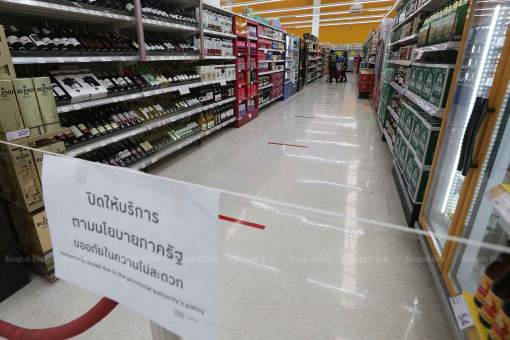Proposal ‘in line’ with tourism plan

The government could scrap the afternoon ban on alcohol sales to further boost its tourism promotion policy.
Public Health Minister Cholnan Srikaew will ask the government’s alcoholic beverage control committee to consider a call by an alcoholic beverage business association to get rid of the rule prohibiting the sale of alcohol between 2pm and 5pm.
In his capacity as chair of the panel, Dr Cholnan said he plans to request a discussion on the Thai Alcohol Beverage Business Association (Tabba)’s petition.
The afternoon ban isn’t actually part of the Alcoholic Beverage Control Act, but an announcement put in place by a coupmaker in 1972, he said. “The committee would have to find out what to do if it agrees the 2pm–5pm alcohol sale ban has to go for the sake of the government’s tourism promotion policy,” he said.
A source on the committee said a conclusion is expected to be reached at the next meeting on Feb 15.
And even though Tabba’s proposal appears consistent with the government’s tourism promotion policy, stricter measures to protect the public, especially minors, from the possible dangers of cancelling the ban will need to be implemented, the source said.
In the event the alcohol beverage control panel approves Tabba’s call, the committee will forward the decision to the national alcoholic beverage policy committee for a final endorsement, the source said.
The national committee is generally chaired by the prime minister or a deputy, the source said.
If the national committee endorses the cancellation plan, a new announcement by the Ministry of Health will be published and the sale of alcoholic beverages between 2pm and 5pm will be allowed, the source said.
The cancellation may be rushed so the new rule can come into force by early April, in time for the annual Songkran festival, said the source.
Last Thursday, Tabba adviser Thanakorn Kuptajit said a new regulation by the Ministry of Interior to allow entertainment businesses in Bangkok, Phuket and Chon Buri to extend opening hours until 4am, which took effect on Dec 15, had yet to fully benefit these businesses due to the afternoon ban.
The regulation imposing the ban is seen by Tabba as a setback, Mr Thanakorn said. The government must take care of this to fully support its tourism promotion efforts, he added.
Along with the cancellation of the 2pm–5pm alcohol sale ban, Tabba is also urging the government to step up enforcement of legal measures aimed at preventing alcohol-fuelled road accidents and illegal alcohol sales to people under 20 years old, he said.
The Thai-Chinese visa-free scheme, due to come into force on March 1, has increased the interest of Chinese people who want to visit the kingdom. The government’s decision to relax alcohol controls should help further boost tourism-related income, he said.
“Regulations that set back tourism or aren’t really necessary should be adjusted to bring them in line with the government’s tourism promotion. This alcohol sale ban is one of those regulations,” he said.
Aside from Chinese tourists, visitors from many other countries are used to sipping alcoholic beverages during meals, particularly dinner, he said.
Tabba has submitted its petition asking for the lifting of the 2pm–5pm alcohol sale ban to PM Srettha Thavisin, DPM Somsak Thepsutin and Dr Cholnan, he said.

